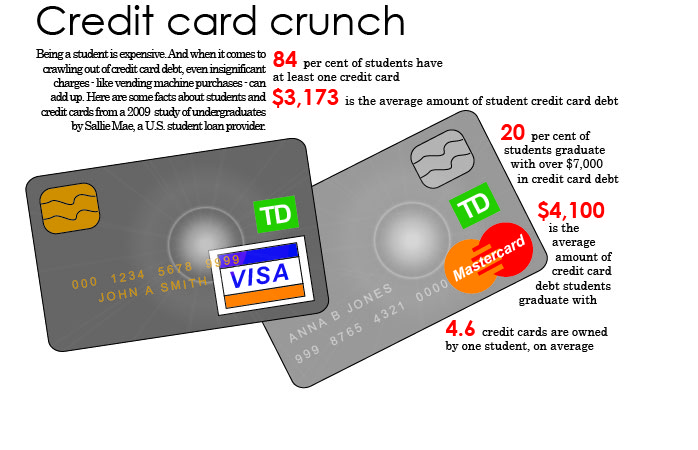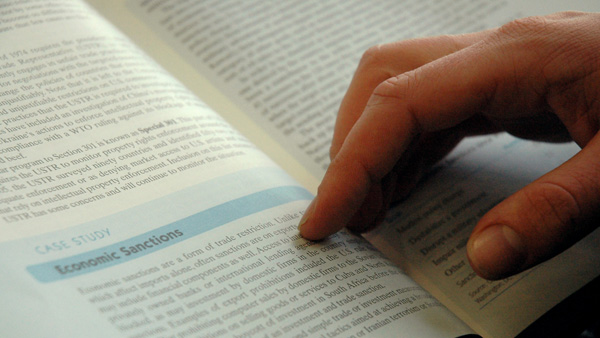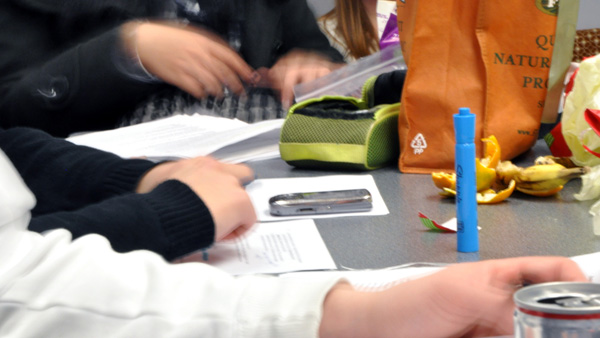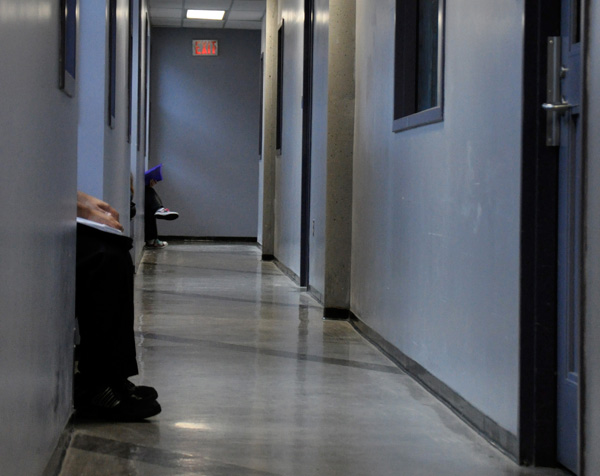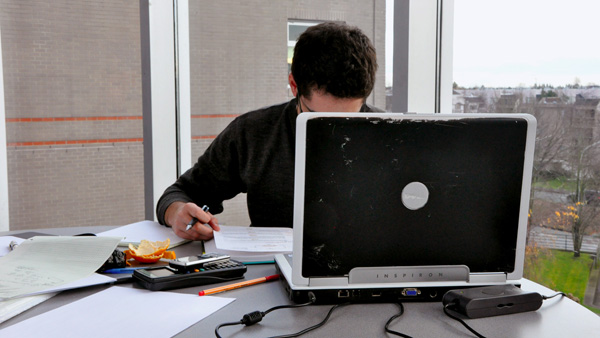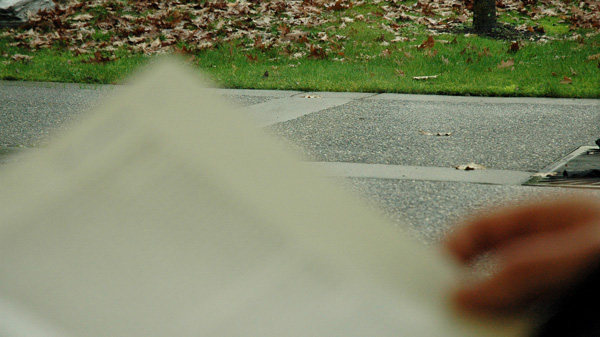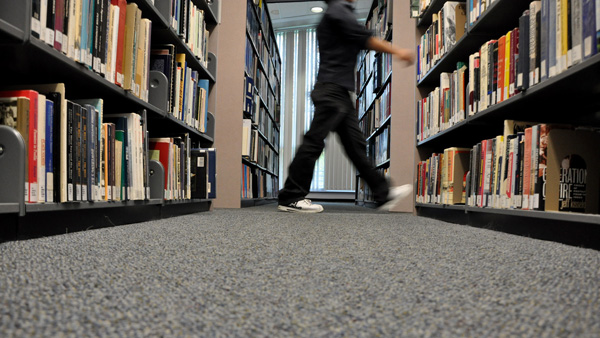Vancouver journalist helping university students with guidebook
April 12, 2011 by Kyle Benning · Leave a Comment
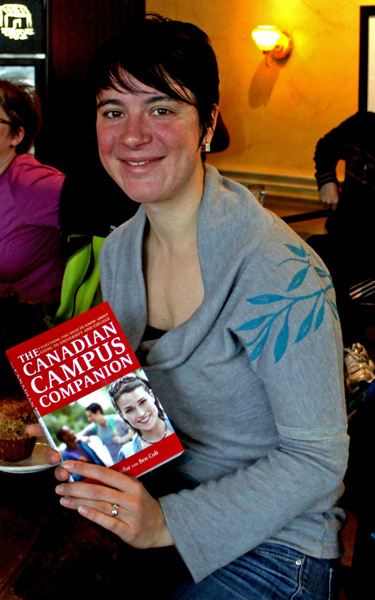
Erin Millar knows too well what it is like to adjust to the post-secondary lifestyle. (Photo by Kyle Benning)
Going into college, Erin Millar thought she was going to be a music teacher.
Now, the Capilano graduate has written The Canadian Campus Companion, a guidebook on going onto post-secondary education in Canada.
The freelance journalist was president of Canadian University Press (CUP) during her time as an editor at the Capilano Courier.
“I really enjoyed [writing] and found my real calling [in journalism],” Millar said.
Millar, who generally writes feature stories, was the first person in her family that attended a post-secondary institution, and she said she learned a lot about the university lifestyle when she moved away from home.
”I remember I moved from Penticton to Vancouver for the first time when I was 18 years old, like everybody else does. It was really challenging. I didn’t know how to do anything. Cap doesn’t have residence, so I had to move into my own place,” Millar said.
“I didn’t even know enough about registering to realize that I had to register myself for English 100. I just sort of assumed I’d show up and I would go to my classes and my program was very set because I was in a very specific program. I didn’t even get all the classes I needed in my first year because I didn’t really realize the process,” Millar said.
Millar co-wrote the book with Ben Coli, her husband, whom she met in Thailand while doing freelance journalism.
“[Coli] went to business school at U of C and worked for a couple years as a property tax consultant and realized that what he really wanted to do was write,” Millar said. “I think we both kind of came at it from other sides, and I think that message is very much in the book to keep your ears open and follow what you really enjoy and it doesn’t necessarily have to be what you expect.”
Millar and Coli got the book deal two days before their April wedding. They started writing the book late, and their deadline was set for Sept. 30 so they could have it on shelves for this spring.
“I feel like the book is a lot better having written it together,” Millar said.
She said that there aren’t many university guidebooks for Canadian institutions and that her book, The Canadian Campus Companion, is the most in-depth university guidebook in the country.
After graduating, Millar found that her passion for writing and journalism was more tempting than a career as a music teacher. She was hired to work full-time by McLean’s Magazine helping with the on-campus website and the university rankings.
Even though she didn’t follow through with her original dream to teach music, Millar keeps her alto saxophone and piano close to her. Millar and her sister are part of a cover band that has been together for seven years.
Criminology club to make a comeback
March 9, 2011 by Jocelyn Gollner · Leave a Comment
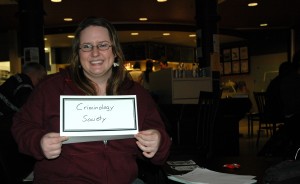
Leah Godin sits at Kwantlen's Club Night on March 3. She is in the process of starting up the Kwantlen Student Society.
Leah Godin, a third-year criminology student, is in the process of making the Criminology Student Society a reality again.
Up until last year, there was a Kwantlen Criminology Club, but according to Godin, the club dissolved after the club’s president graduated and no one took over the role.
Now Godin is encouraged and excited to bring it back to Kwantlen. But this time as a society, instead of a club. One of her instructors just thought it sounded better that way.
“I’ve announced it to a few of my classes, and I’m getting the instructors to tell their classes,” Godin said. “There are a bunch of people who are really excited about doing it, so it’s just the initial bit. You need to get so many people to sign up, which isn’t that much really, it’s only like 10 members.”
Godin had about 10 people sign up at the Kwantlen Club Night alone, which was on March 3 at the Grassroots Cafe.
The society will start out with a general meeting to see what students want from the society. Then, once it’s up and running, there will be field trips, talks given by instructors from Kwantlen and other post-secondary institutions, movie nights, pub nights, discussion groups, as well as information on how students can get involved in their community.
This club is open to all Kwantlen students, not just criminology students.
“I don’t want to cut anyone out of an opportunity because they might actually realize that they really like criminology and maybe later major in it,” Godin said.
It’s clear that Godin is passionate about starting up the Criminology Student Society.
“For some reason, this semester I’ve been getting really involved with what’s going on around campus,” Godin said. “The possibilities are endless, and I just feel that all Kwantlen students should be able to embrace what’s out there and what’s available.”
If you’re interested in joining the Criminology Student Society, email Godin.
Credit cards: it’s no small change
March 9, 2011 by Hayley Woodin · Leave a Comment
If you fancy a bottle of Coke or a sugary snack but don’t have the cash, you can indulge your sweet tooth by adding a buck fifty to your credit card bill. Several vending machines throughout Kwantlen give students the option to swipe their VISA or Mastercard, but that’s a convenience students can’t use when it comes time to pay their tuition.
The school chose to end credit card payment for tuition beginning in the fall 2010 semester, explaining the transaction fees credit companies charge is “quite absorbent,” especially when thousands of students pay their tuition during the same period.
The university has stated that it expects to save $250,000. The money will go to students in the form of scholarships and bursaries.
Kwantlen isn’t the first post-secondary institution to implement the change. Both the University of British Columbia and Simon Fraser University have also stopped accepting credit cards as a method of tuition payment.
On the Kwantlen website, it states that the only things domestic students can’t pay with a credit card are tuition, student fees and KSA fees. Other fees and services are payable with credit.
According to the school, “you can use your VISA or Mastercard for the commitment fee but that’s as far as it goes.”
Early Alert can lead to student success
January 17, 2011 by Stu Gallacher · Leave a Comment
Kwantlen Polytechnic University is raising the bar by providing more student success programs, such as the relatively new Early Alert program.
The first step in Early Alert is for an instructor to recognize that a student is having difficulty, which can range from poor attendance, to signs of distress and disruptive behaviour in class, underdeveloped study skills, or failing grades.
“It’s what we call an interventionist program, so we don’t leave it to chance for a student to get connected with services that can help them,” says Lyn Benn, Director for Student Development. “We’re one of the earlier institutions in Canada to put this program in.”
Early Alert began at Kwantlen in the fall 2009 semester, with roughly 60 student referrals. The program saw an increase in referrals, to over 250 in fall 2010.
There are two categories for students who are referred to Early Alert: successful contacts and unsuccessful contacts. A successful contact is a student who is contacted by the Early Alert Team. Not surprisingly, an unsuccessful contact is a student who can’t be reached.
Statistics for the fall 2010 semester show 47 per cent of successful student contacts resulted in passing grades, while 21 per cent withdrew from the course and 31 per cent failed the course. In comparison, the unsuccessful student contacts resulted in 53 per cent of those students failing the course, 24 per cent withdrawing, and only 22 per cent passing the course.
“The sooner students know how to get access to resources and the help they need, the better off they are,” says Benn.
Benn points out that there are cases where students don’t withdraw from a course, because they’re simply unaware of procedures.
“Sometimes [a student] hasn’t attended a course, because they’ve decided to drop it, but they didn’t know the rules and regulations for dropping. So instead of getting a W for withdrawal, they get an F.”
Benn also says that a lot of students don’t know the deal with the GPA (Grade Point Average), but they need a GPA over 2.0 to graduate.
“When you get an F, it really pulls your GPA down.”
Benn says that the main purpose of Early Alert is to maintain student retention and student persistence.
“We don’t want to lose students, because it’s an investment for everybody. We want students to be successful.”
SFU’s FD grade seen as necessary; Kwantlen has no plans to introduce it
December 15, 2010 by Brian Russell · Leave a Comment
It was a little more than a year-and-a-half ago that a senate sub-committee for Simon Fraser University implemented the FD grade, also known as failure for academic dishonesty, in an effort to strengthen the school’s policies on academic integrity and prevent cheating by use of the internet.
Today, SFU is still the only university in Canada that uses the FD grade, which stays on a student’s transcript for two years after graduation.
Kate Ross, SFU’s registrar and executive director, student enrollment explained the rest of the FD grade’s process.
“If no further acts of academic dishonesty have occurred [after two years], the registrar will automatically change the grade to F,” said Ross.
Although no statistics on how many students have been affected by this grade have been released yet, SFU students have been generally accepting of the grade’s purpose since its introduction. General studies student Jayna Bhindi believes that the FD grade is necessary for students who cheat.
“If I receive an FD, then not only does it mean that I plagiarized in that specific course, but it can also give the impression that I may have done the same thing in my previous classes and I was lucky enough to not have got caught, so whoever receives an FD receives it because that’s what they essentially deserve,” said Bhindi.
Silvia Duran, also a general studies student, agreed with Bhindi.
“[An FD] blatantly states the dishonesty that the student receiving the grade has practiced, and it not only shows future…schools, or even employers that you’ve failed, but you’ve failed for passing off somebody else’s work as your own,” said Duran.
A third student, Alvin Gutierrez, has some doubts about the grade.
“To me, there’s an inconsistency with the FD grade because what if a student simply forgets to put quotes around something someone said? I’m not sure how easy it would be to get out of that one,” said Gutierrez.
The question now is whether any other universities in Canada will follow suit and implement an FD grade of their own.
“We have certainly had inquires about [the FD grade], but to date I am not aware of anyone else introducing it in Canada,” said Ross.
Kwantlen Polytechnic University’s director, admissions and records, Zena Mitchell, said Kwantlen has no plan of introducing an FD grade at this time.
Pictures: Kwantlen without Faces
December 14, 2010 by Paul Fleischanderl · 1 Comment
All students have to write exams, all students have to study. These pictures could show any student’s life. Welcome to an average day at Kwantlen.

Students' feet on the second floor of Kwantlen's Richmond campus on Dec. 7. (Photo by Paul Fleischanderl)
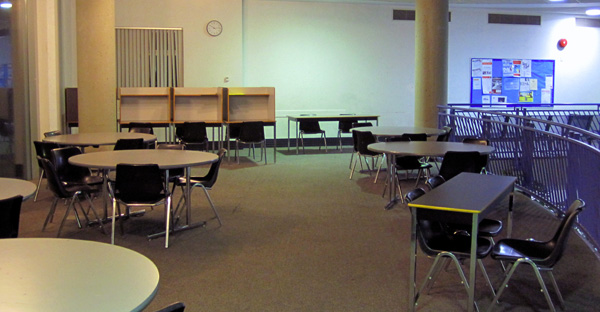
Abandoned second floor at Kwantlen's Richmond Campus on Dec. 6, 10:14 pm. (Photo by Paul Fleischanderl)
Events for students: Fright Nights at the PNE
November 1, 2010 by Brian Russell · Leave a Comment
Talysa Dhahan and Brian Russell visited Fright Nights at the PNE on Oct. 23 for the first in a series of reports on events for students.
How Facebook has affected dating
October 19, 2010 by Miranda Gathercole · Leave a Comment
Meagan Gill, Miranda Gathercole and Sarah Casimong explore how Facebook has changed the dating world for university students, as part of a continuing series on life in the age of social media.
Opinion: Increasing minimum wage makes sense
October 12, 2010 by Jeff Groat · Leave a Comment
It’s time to raise the minimum wage in B.C. — the province’s students have it hard enough.
Last month, Carole James, leader of the provincial NDP and the official opposition, raised the notion of increasing the minimum wage from $8 an hour to $10. Such a raise would take the province from having the lowest minimum wage in Canada to having one of the highest. (The minimum wage in B.C. hasn’t been increased since 2001.)
It’s important to note that Metro Vancouver has one of the highest costs of living in the country, meaning that the dollars spent on rent, groceries and utilities don’t go nearly as far as money being spent in other major Canadian cities.
None of this is lost on Canadian students. Tuition costs continue to climb (up about four per cent this year), as most full-time students continue to work part-time or take out student loans in order to support themselves. It is a common sight to see three, four or five students crammed into a small apartment or suite in any neighbourhood in Metro Vancouver, sharing the rent in one of the most expensive markets in the country.
Of course, one of the biggest arguments against increasing the minimum wage is the fact that the rise in operating costs will hit smaller businesses hardest. Opponents to the increase claim this would result in fewer jobs in the province, and in effect, make circumstances worse than they already are.
The only problem with this argument is that it is an all-too-common refrain of right-wing think tanks such as the Fraser Institute, backed up with questionable data and liberal interpretations of Statistics Canada reports.
That’s not to say that there will never be adverse effects of an increase to the minimum wage, but the effects of keeping it at a Canada-wide low of $8 are adverse enough.
Given the fact that, according to Stats Can, 59 per cent of minimum wage workers are 15 to 24 years old — a large portion of whom are students and are the future cultural, political and business leaders of the country — it is time to consider this as a sound economic investment in our future.
In fact, Ontario pays the highest minimum wage in Canada at $10.25 per hour, but remains as one of the top economic performers in the country.
It’s time to keep up with the times and raise the minimum wage in this province.
Students need to move to avoid pains of sitting
October 12, 2010 by Matt Law · Leave a Comment
Proper posture is not something on the minds of most university students, but the way you’re sitting may be affecting you more than you think.
“Sitting is an issue in the population at large, and so what we’re seeing, progressively, is a decline in physical capability and a progressive increase in muscular tension,” said Dr. Michael Vipond, a chiropractor for 26 years.
“I think the biggest issue, especially if you’re a student in their 20s, is that you just don’t think about it being an issue because you’re bendable enough that you think it’s no big deal.”
When a person sits for an extended period of time, some muscle groups are both shortened and stretched, creating muscle imbalance and weakness. Over time, this can reduce mobility and cause lower back and neck pain
“The classic places you will see it when you’re sitting are in the hamstrings, the hip flexors, the deep hip flexors and the anterior muscles of the neck and the chest,” said Vipond. “When you slump [in a chair], you’re reversing the curve of your lumbar spine, so that puts abnormal stress on it.”
The perils of the laptop
Working on a laptop computer can also cause added stress to the neck and chest.
“If it’s a desktop, at least you have the opportunity to create decent ergonomics, but with a laptop, you’re either too high with your hands or too low and then you have to drop your head down to see it,” said Vipond.
Years of sitting in a poor position and slumping in your chair, can cause a type of injury classified as progressive micro-trauma, a chronic injury that builds up over time.
“It’s not something that you do in a couple of minutes or even an hour, but you do it over day after day after day. What magnifies the effects of the postural change is when you hit deadlines, exams, all the things where you’re adding additional muscular stress or tension or anxiety, and that just ramps up the muscle changes all over,” said Vipond.
According to Vipond, students should be moving around every half-hour or at least changing their position while they sit. Performing a range of motion exercises to help combat imbalances created by sitting can be a big help, too.
“Range of motion is usually the key thing, so for your neck, that’s forward and back, turning left and right and tilting left and right. Even in your chair, you can do those same motions through your trunk, bending forward and tilting and turning.”
Vipond also suggests rolling up a towel or sweater and placing it between the small of your back and the chair to maintain the natural curve of your spine.
“Just getting out and moving around is one of the key things, and if they [students] aren’t exercising, at the very least what they should be doing is some stretching exercises to try and counter act those changes,” said Vipond.

